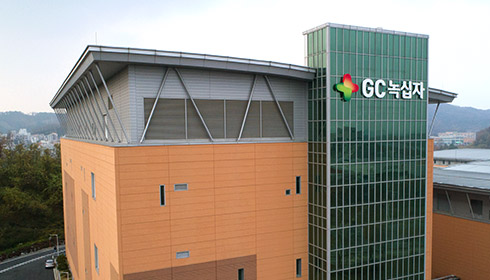GC Biopharma’s intracerebroventricular (ICV) Hunterase, a treatment for severe Hunter syndrome, is expanding globally by entering Russia following Japan.
Hunter syndrome is a rare congenital disease characterized by a deficiency of the enzyme I2S (Iduronate-2-sulfatase). It results in skeletal abnormalities and reduced intelligence. It is estimated to affect one in 100,000 to 150,000 male children.

Hunterase ICV is the only treatment worldwide that improves central nervous system symptoms by delivering medication directly into the ventricles of the brain using a device inserted into the head. This delivery method delivers the drug to the patient's blood vessels and central nerve cells, relieving symptoms caused by central nervous system damage, including cognitive loss and delayed psychomotor development.
GC Biopharma said Wednesday that it has received marketing authorization from the Ministry of Health of the Russian Federation for Hunterase ICV. This is the first time a drug for severe Hunter syndrome has been approved in Russia.
In 2021, GC Biopharma became the first company to obtain marketing authorization for Hunterase ICV in Japan. With the latest approval, Russia became the second country to grant marketing authorization to Hunterase ICV.
About 70 percent of people with Hunter syndrome suffer from severe central nervous system damage, and the disease has high unmet needs.
“The IV (intravenous) formulation of Hunterase was approved in Russia in 2018 and has since been available. With the approval of Hunterase ICV, we will provide a new treatment option for patients with severe Hunter syndrome, which has a high unmet need,” said Lee Jae-woo, head of GC Biopharma’s Development Headquarters, who led the approval process.
Hunterase ICV is also in a phase 1 clinical trial in Korea.
Related articles
- GC Biopharma, Dong-A ST expand collaboration on mRNA-LNP technology for chronic inflammatory diseases
- GC Biopharma partners with Kanaph Therapeutics to co-develop bispecific ADC
- GC Biopharma partners with NEX-I to develop a new cancer immunotherapy
- GC Biopharma, Novelty Nobility sign joint R&D agreement for geographic atrophy treatment
- GC Biopharma secures flu vaccine bid in Thailand for 2nd consecutive year
- GC Biopharma study shows fenofibrate reduces risk of end-stage renal disease
- Hanmi and GC Biopharma to begin global trials for monthly Fabry disease treatment
- GC Biopharma’s Hunterase ICV gets orphan drug designation
- GC Biopharma's Hunterase improves exercise capacity in phase 3 hunter syndrome study

